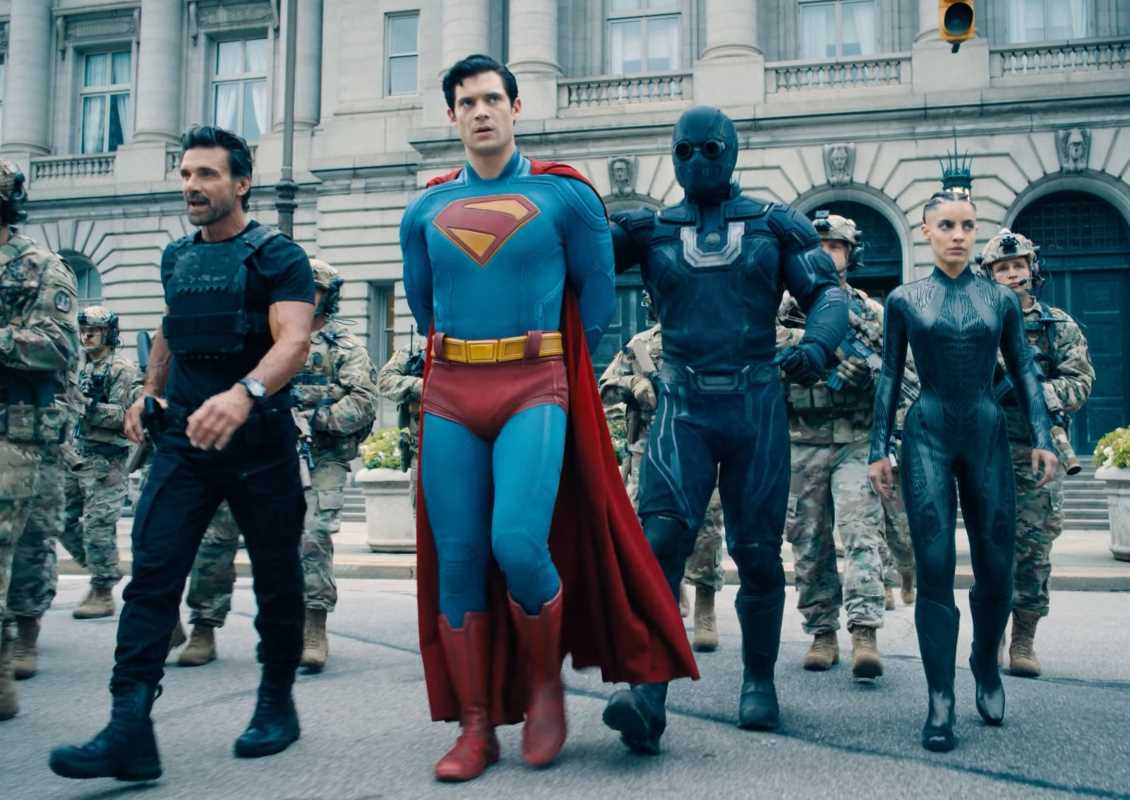Superman has always been more than just a superhero. From his origins as a Kryptonian orphan raised by farmers in Kansas, Superman has served as a metaphor for America’s ideals, struggles, and aspirations. James Gunn’s Superman (2025) continues this tradition, using Clark Kent’s story to explore some of the most significant political and cultural debates of our time. Through its depiction of war, global ethics, surveillance, and immigration, the film holds a mirror up to the world we live in today, offering a vibrant but thoughtful commentary on humanity’s challenges.
Superman and the Boravia-Jarhanpur Conflict
A major focus of Superman (2025) is the fictional war between Boravia and Jarhanpur, two nations with outright metaphors for real-world geopolitical tensions. Boravia, with its Slavic aesthetics and alliance with the U.S., resembles Eastern European nations, while Jarhanpur, a resource-rich desert state with a history of foreign intervention, recalls Middle Eastern countries. The narrative avoids directly favoring one real-world conflict over another but instead blends these influences to examine the broader issues of international intervention.
Superman’s role in this conflict is nuanced and deliberate. When called upon by U.S. officials to intervene in the crisis, Superman initially hesitates, wary of being used as a political pawn. This doubt reflects growing skepticism in America about foreign interventions, where humanitarian efforts are often entangled with strategic interests. The movie parallels recent criticisms of U.S. foreign policy, particularly regarding regime changes and military engagements in oil-rich or geopolitically significant nations. Unlike past portrayals of Superman as a purely patriotic figure, Superman (2025) emphasizes Clark Kent’s moral independence, showing him challenging the assumption that "might makes right."
This shift feels particularly poignant in today’s political climate. Amid controversies surrounding interventionist wars and debates about America’s role as the “world’s policeman,” Superman’s refusal to align himself wholly with any government resonates deeply. His ultimate decision to defy orders and save innocent lives—even when it complicates U.S. military objectives—is a potent reminder that morality isn’t dictated by politics.
Lex Luthor’s Silicon Valley Persona
While Superman grapples with geopolitical dilemmas, Lex Luthor emerges as a modern antagonist rooted in contemporary anxieties. Luthor, portrayed with Machiavellian intensity, is a tech mogul focused on acquiring government contracts for surveillance technology and military hardware. His persona draws sharp comparisons with real-world Silicon Valley figures who wield immense, often unregulated power through data-driven industries.
Luthor’s character critiques the unchecked influence of corporations on global politics and individual freedoms. The film reveals his involvement in manufacturing advanced weapons as well as misinformation campaigns designed to exacerbate the Boravia-Jarhanpur conflict. By fabricating intelligence and manipulating the public, Luthor maximizes profits while consolidating his influence.
This depiction captures concerns about the ethics of corporate surveillance and data use, themes that are increasingly relevant in the age of tech giants. It asks difficult questions about accountability, shedding light on the collaboration between corporations and governments in areas ranging from digital privacy infringement to tech-supported saber-rattling. Superman’s clash with Luthor becomes symbolic of society’s ongoing fight against the erosion of truth and trust in the digital age.
A Superhero Who Rejects Blind Patriotism
One of the standout elements of Superman (2025) is its nuanced portrayal of American patriotism. Throughout the film, Superman grapples with his role as an alien raised in the heartland of the U.S., embodying both the outsider and the insider. The story acknowledges Clark Kent’s immigrant backstory, emphasizing themes of integration, identity, and the pursuit of “truth, justice, and the American way.”
However, the film critically examines what “the American way” means in modern times. Superman’s resistance to becoming a tool for the government highlights a key message: patriotism is not blind allegiance but a commitment to holding power accountable. The tension between Superman and U.S. officials, particularly those pressuring him to take specific actions in Boravia and Jarhanpur, underscores the importance of separating personal values from nationalistic agendas.
This ethical struggle mirrors contemporary debates about nationalism and what it means to represent a country in a globalized world. Just as Superman chooses to act based on his personal conviction rather than state interests, the film subtly critiques the conflation of patriotism with complicity in questionable policies.
Weaponized Outrage
In Superman (2025), Lex Luthor’s use of monkeys trained to write angry tweets about Superman is a sharp commentary on the manipulation of public opinion in the digital age. This absurd yet darkly humorous plot point highlights how misinformation and social media can be weaponized to sway public perception.
The monkeys, symbolizing the mindless spread of outrage, serve as a metaphor for the way algorithms and bots amplify negativity online. By flooding social media with anti-Superman sentiment, Luthor creates a false narrative that paints the hero as a threat rather than a savior. This reflects real-world concerns about the role of disinformation campaigns, troll farms, and automated accounts in shaping public discourse and eroding trust in institutions.
The scene also underscores the fragility of public opinion in a hyperconnected world. Despite Superman’s genuine efforts to do good, the barrage of negative tweets begins to influence how people view him, showing how even the most virtuous figures can be undermined by a well-coordinated smear campaign. It’s a clever and timely critique of how easily truth can be distorted in the digital age, making it one of the film’s standout moments of cultural commentary.
Reflection on Immigration and Resilience
Superman’s immigrant origins have always been a central theme, but this film recontextualizes them for today’s political landscape. Clark Kent’s dual identity as an alien and a Kansas farm boy becomes a powerful symbol of resilience and integration. The film celebrates diversity and the idea that strength comes from combining different perspectives and experiences.
One particularly moving scene involves Superman speaking to a group of Jarhanpurian refugees, who are caught between their oppressive government and the brutal invasions of Boravia. Drawing from his own experience as an outsider, Superman demonstrates empathy and solidarity, reminding them of their inherent value and their power to rebuild. This moment underscores the relevance of immigration in today’s discussions about political borders, human displacement, and belonging.
Superman’s ability to embody hope and bridge divides reinforces the value of human kindness, a theme director James Gunn has described as central to the story. It’s a poignant reminder that in divisive times, compassion and community remain vital.
Global Interventionism and American Exceptionalism
By weaving together themes of global interventionism and ethics, Superman (2025) presents a nuanced critique of American exceptionalism. Planet Watch, the film’s SHIELD-like agency, represents the pitfalls of centralized, unchecked authority. Initially hailed as a force for good, it’s ultimately revealed to be a front for Lex Luthor’s personal ambition. This revelation calls into question the effectiveness and morality of interventionist policies that prioritize resource control or power dynamics over true humanitarian efforts.
The choice to expose Planet Watch as corrupt provides a stark contrast to Superman’s moral clarity. His rejection of their manipulative tactics sends a clear message about personal responsibility and the necessity of transparent governance.
Hope Against Cynicism
What makes Superman (2025) particularly powerful is its refusal to lapse into full cynicism. While it critiques systemic issues like corporate overreach, political manipulation, and interventionism, it always keeps hope alive. That hope is embodied in Clark Kent’s upbringing by the Kents, whose simple values of decency and hard work ground his larger-than-life heroics.
Another notable aspect of the film is its portrayal of the media. Lois Lane’s investigative journalism plays a key role in exposing Planet Watch’s corruption, emphasizing the role of free press in holding power accountable. At a time when the integrity of journalism is under constant attack, this subplot serves as both a tribute to and a reminder of the importance of ethical reporting.
Relevance for Modern Audiences
Ultimately, Superman (2025) offers a meaningful and timely reflection of the world we live in. Its exploration of immigration, ethical governance, the abuses of technology, and the nuances of moral leadership taps into the anxieties and aspirations of the present day. By presenting Superman as both a symbol of hope and a participant in complex, morally ambiguous situations, the film speaks to the challenges of navigating a world where the lines between right and wrong are increasingly blurred.
Rather than delivering easy answers, Superman (2025) invites its audience to grapple with these issues alongside its hero. Can compassion overcome cynicism? Can those in power be held accountable? And can we, like Superman, act with integrity even when the odds are stacked against us? These are the questions that linger long after the credits roll, making the film a poignant and relevant entry in the superhero genre.
 (Image source: DC Studios)
(Image source: DC Studios) 





